|
|
|
Sort Order |
|
|
|
Items / Page
|
|
|
|
|
|
|
| Srl | Item |
| 1 |
ID:
122567
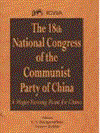

|
|
|
|
|
| Publication |
New Delhi, Pentagon Press, 2013.
|
| Description |
xiv, 341p.Hbk
|
| Standard Number |
9788182747241
|
|
|
|
|
|
|
|
|
|
|
|
Copies: C:2/I:0,R:0,Q:0
Circulation
| Accession# | Call# | Current Location | Status | Policy | Location |
| 057377 | 324.251075/RAN 057377 | Main | On Shelf | General | |
| 057557 | 324.251075/RAN 057557 | Main | On Shelf | General | |
|
|
|
|
| 2 |
ID:
167311
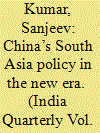

|
|
|
|
|
| Summary/Abstract |
In recent years, there has been a rise in China’s profile in South Asia. It is no surprise that Chinese experts have used terms, such as ‘new springtime’ in China–South Asia relations, ‘rediscovery of the strategic status of South Asia’ and ‘most relevant region with regard to the rise of China’. The objective of this article is to examine the nature and drivers of China’s South Asia policy, especially under the leadership of Xi Jinping vis-à-vis China’s policy towards the region in the past. It is not sufficient to only examine international factors or foreign and security policy in the context of the neighbouring region, such as South Asia. China’s ‘domestic periphery’ presents a significant threat to its national security. These areas are linked to neighbouring countries of South Asia and Central Asia.
The announcement by Chinese President Xi Jinping of a ‘New Era’ or ‘third era’ in the history of Communist Party of China (CPC) represents a China which is known for its dictum ‘striving for achievement’ (fenfa youwei). This is different from the second era’s policy of ‘keeping a low profile and biding the time’ proposed by Deng Xiaoping. Of course, the name of Mao Zedong is synonymous with the first era beginning from 1949.
|
|
|
|
|
|
|
|
|
|
|
|
|
|
|
|
| 3 |
ID:
161980
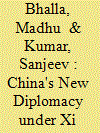

|
|
|
| 4 |
ID:
172319
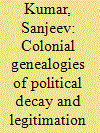

|
|
|
|
|
| Summary/Abstract |
This article is an attempt to conceptualise and theoretically explain the colonial genealogies of the processes of state-making and state-construction in post-colonial South Asia. In pursuit of this, the article seeks to theorise the colonial ways of providing a sense of fixity of political territoriality, held together by colonially crafted institutions of metropolitan governance, as an independent variable in determining the nature of the processes of state-making and state-construction in the region. On this count, an enquiry into the complex trajectory of these post-colonial political processes, which are the dependent variables for this article, is the fundamental problematic of analysis. This problematic would be decoded with the help of a dual conceptual framework, involving what Samuel Huntington designates as political decay and the legitimation crisis given by Jurgen Habermas. In the context of South Asia, the predicaments of political decay and legitimation crisis, according to this article, manifest as after-effects of engagement on the part of the region’s post-colonial polities with the imported values of colonial modernity and neoliberal economic reforms. By drawing instances from two countries of the Indian subcontinent, Pakistan and Bangladesh, the article tries to show how these after-effects have played out in the form of a tumultuous political history of the processes of state-making and state-construction. The article, in this way, is an attempt to theorise the inter-sectionalities between the colonial and post-colonial periods of South Asia. This has been done here by problematising such a historical inter-sectionality from the perspective of the two intervening variables—the received values of colonial metropolis and the morals of modernity—mediated through neoliberal economic reforms.
|
|
|
|
|
|
|
|
|
|
|
|
|
|
|
|
| 5 |
ID:
076315
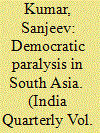

|
|
|
| 6 |
ID:
160013
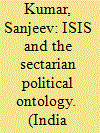

|
|
|
|
|
| Summary/Abstract |
Islamic State of Iraq and Syria (ISIS) as a radical organisation acquired a massive global appeal by virtue of stretching its ideological influence beyond Arab-centric focus and recruiting followers from across the world. Central to such widespread popularity was the conception of a unified Islamic Ummah which is located in a transnational Islamic State (IS) (Caliphate) that is governed in accordance to the tenets of Islamic law (shari’a). However, at the heart of this idea was a militant sectarian political ontology that distorted the notion of a unified Islamic Ummah. Articulated as a global grand strategy, the cosmopolitan Islamic imagination of the ISIS has been nothing more than a myopic assertion of a fanatic ideology of violence and terrorism. By sustaining such a notion through a forceful imposition of a Kharijite brand of extremism and sectarianism, the ISIS sought to contort the tolerant multifaceted and multilayered fabric of Islam that tends to accommodate diverse ethno-nationalistic, linguistic and racial pluralities and believes in the metaphysical communion of multiple faiths. The aim behind such an endeavour was the elimination of all those whom the ISIS considers as opposed to its ideology which is embedded in a narrow sectarian interpretation of what it designates as pure Islam. The genealogical impulse that lies at the bottom of such an ideology was its grand vision to assume a hegemonic position in the sphere of global jihadi movements.
|
|
|
|
|
|
|
|
|
|
|
|
|
|
|
|
| 7 |
ID:
193412
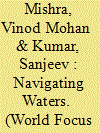

|
|
|
| 8 |
ID:
193448
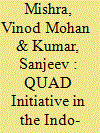

|
|
|
|
|
| Summary/Abstract |
This research paper delves into the Quad (Quadrilateral Security Dialogue) alliance’s role and significance in shaping the geopolitical landscape of the Indo-Pacific region. Through a comprehensive analysis of the strategic imperatives driving the QUAD countries - the United States, Japan, India, and Australia - this study examines the alliance’s evolving objectives, regional partnerships, and the impact on maritime security, economic cooperation, and diplomatic alignments.
|
|
|
|
|
|
|
|
|
|
|
|
|
|
|
|
| 9 |
ID:
193391
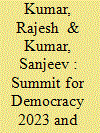

|
|
|
|
|
|
|
|